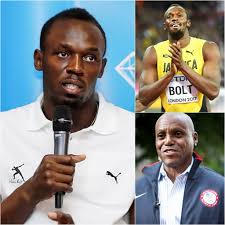
When Sir Mo Farah speaks, the sporting world listens. The legendary British distance runner, known for his Olympic dominance on the track, sent shockwaves far beyond athletics this week when he waded into the storm surrounding Usain Bolt’s much-discussed return to competition. In a statement that was as emotional as it was controversial, Farah defended the Jamaican sprint icon, accusing the sporting establishment of abandoning one of the greatest athletes of all time.
“What’s happening to Usain Bolt is a crime against athletics,” Farah said bluntly during an interview that has since gone viral. “How can it be so cruel to abandon a man who has dedicated 39 years of his life and carried the weight of an entire country like Jamaica?”
The words hit like a thunderbolt. For many, Bolt remains the face of modern athletics—a global superstar who not only redefined sprinting but elevated track and field into mainstream culture. Yet questions about his comeback, alleged lack of institutional support, and the politics around his potential re-entry have fueled heated debate. Farah’s impassioned defense was seen as both a challenge to governing bodies and a reminder of Bolt’s unique contribution to sport.
What truly lit up the conversation, however, was Farah’s chilling 12-word warning:
“If athletics betrays Bolt now, the sport may never recover again.”
Those words spread instantly across social media, igniting fiery reactions from athletes, fans, and pundits. Some applauded Farah for standing up for a fellow legend, while others argued that no athlete, regardless of stature, should be given special treatment. The athletics community is no stranger to passionate debates, but this one carried an intensity that transcended the track.
And then, in a twist that nobody expected, the alleged culprit—whose decisions supposedly left Bolt isolated—responded just five minutes later. The figure in question, believed to be a high-ranking official within World Athletics, fired back with a sharp rebuttal. “Athletics does not abandon its champions. Rules are rules, and even legends must respect them,” the statement read.
That reply only deepened the divide. Supporters of Bolt and Farah blasted the official’s tone as “cold” and “disrespectful,” while critics argued that bending regulations for a star athlete could undermine fairness and credibility in the sport.
The incident also bled into other sporting circles. Swimming analysts, cycling commentators, and even football figures weighed in on the controversy, proving that Bolt’s influence reaches far beyond the track. For many, the question is no longer just about whether the Jamaican should be allowed to return, but about how sports honor their legends when their careers wind down.
Farah’s intervention, coming from a fellow Olympic great, ensured that the spotlight on Bolt’s situation would not dim anytime soon. His words echoed the bond between athletes who know the grind, sacrifice, and isolation of elite performance. Whether one agrees with his fiery declaration or not, it is undeniable that Farah has forced the global athletics community to face uncomfortable questions.
As of now, the athletics world waits for Bolt’s own response. If history tells us anything, the Jamaican sprint king won’t stay silent for long—and when he speaks, the world will be listening.
Be the first to comment